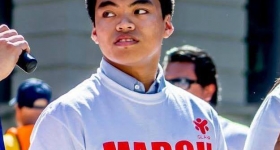Originally posted at New America Media.
by Samantha P. Yang
Like thousands of other California parents, Khu Yang Lee is anticipating the day when her two children can start kindergarten. But, Lee, a member of the growing Hmong community in the state’s Central Valley, was surprised to learn that a new state law might place her children in different programs depending on when they were born.
The statute, called the Kindergarten Readiness Act, emerged from research showing that children only a few months shy of age five are still not developmentally ready for kindergarten.
The new law makes two key changes. One adds a year-long transitional class for small children, who are born after the new kindergarten enrollment date in the coming years and are usually too young to have the concentration yet for regular kindergarten.
Currently, California parents could enroll their children in kindergarten, if they turned five by December 2. The state will now gradually move the cut-off date to September 1, over a three-year period, from 2012 to 2015.
Impact on Fresno’s Hmong Community
Although the new kindergarten act applies to all California children, many parents, such as Lee, in the state’s rapidly growing ethnic communities remain unaware of the change.
For example, the legislation’s impact on Hmong families will be significant. US Census for 2000 (the 2010 figures are not yet available), showed that the Hmong community Lee belongs to in Fresno County alone, included 169,428, and about one in eight were ages five or younger.
Although the transitional classes won’t begin until 2012, the Fresno Unified School District and others in California actually started a pilot trans-K program last year or plan to this fall.
Once the full, statewide programs begin next year, every school district will have a transitional kindergarten program. For 2011, however, families may not know until after school starts in September whether their child’s school will have enough enrollment for a transitional pilot, according to Michele Copher, executive director of Fresno County Office of Education.
Although the school choices are not yet final, Fresno’s Edith B. Storey Elementary is one of those hoping to begin the transitional kindergarten program this fall. If it is selected, the school will send notices to parents of children who qualify for the program.
Language Barriers
Elizabeth Sullivan, a kindergarten teacher at Storey is hopeful that the program will help her students. But she is also concerned about language barriers they may experience to learning.
Sullivan’s kindergarten classroom mainly includes Hmong and Hispanic students, plus one African American child. Her classroom, though, now has help from only one Spanish-speaking teacher’s aide. Also, the school has one a Hmong kindergarten teacher.
According to data from the California Department of Education, the Hmong language ranks second at Storey Elementary School. When prompted, though, a school representative said that although newsletters will be sent to parents, she could not say whether the information would be translated into multiple languages, or what languages the school would use.
In March, however, the Fresno County Office of Education held a summit on transitional kindergarten. Although all if the information is available online, most is available only in English. Whether or not local schools will translate newsletters to parents in multiple languages is at the discretion of the school. The Fresno County Office of Education provides a “Transitional K FAQ” sheet in English and Spanish, but currently none in the Hmong language.
Mixed Feelings
In spite of many positive aspects of the new program, Frenso’s Hmong parents expressed mixed feelings about the change, echoing those of other parents around California. If parents do not wish for their child to attend transitional kindergarten, they can challenge the policy. Each case would then be handled case-by-case by the appropriate school district.
Shirley Esau, principal and a teacher at Kingsburg Elementary School said the biggest misconception about transitional kindergarten is that some parents believe the trans-K classes will hold back their child.
She noted, “Many parents think you’re telling them that their child is not prepared for kindergarten, but that’s not the case.”
Esau has observed positive results in her trans-K classroom. She explained that students in her class, who were give the Developmental Reading Assessment, trailed behind the traditional kindergarten classroom by only one point on average.
More important, she said, children in transitional kindergarten are better able to interact socially with other children. They are also more prepared to enter kindergarten successfully.
Also, fortunately, the state’s budget crunch will not affect this new program because it doesn’t require additional funding for transitional kindergarten classes. That’s because the overall number of children will remain the same in a given school year, and the younger children will simply move to the more appropriate classes.
When told about the transitional kindergarten, Susan Vang, a recent Fresno State graduate student, who intends to become a teacher, said, “There are lots of students who don't end up going to preschool, so those students need extra help from their parents to get them ready for kindergarten.”
Vang, who has volunteered with kindergarten children, said, “I see students who have not gone through preschool or the kindergarten-readiness programs that are so behind. It becomes frustrating for the teachers who have to spend weeks getting these students caught up to the standards. So this program will ensure that these students will be socially and mentally prepared when they enter kindergarten.”









Comments